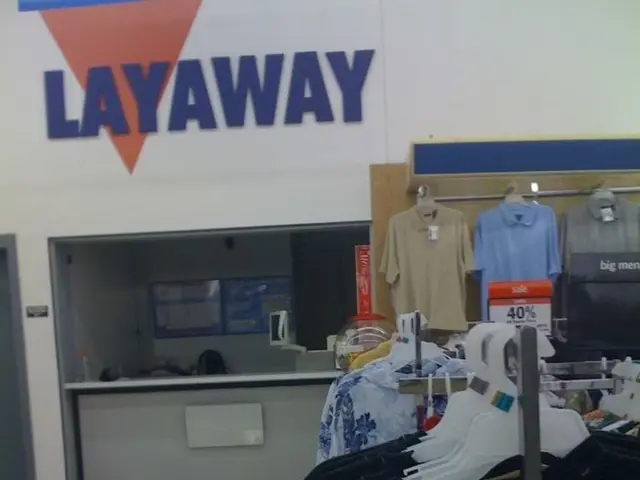Update on Blockchain Technology Enhancing Transparency and Security in Global Supply Chains, 2025 Version
In the ever-evolving landscape of business and technology, blockchain has emerged as a transformative force in supply chain management. This decentralized, immutable database system offers more than just security; it provides clarity, transparency, and efficiency. Here are some real-world examples and benefits of blockchain in supply chains.
### Benefits of Blockchain in Supply Chains
1. **Improved Transparency and Traceability**: Blockchain's shared ledger ensures that all stakeholders have access to the same real-time transaction data, reducing the risk of counterfeiting and enhancing transparency throughout the supply chain [1][3].
2. **Enhanced Efficiency through Automation**: Smart contracts can automate processes such as inventory tracking, logistics management, and payment processing, reducing human errors and increasing efficiency [1][3].
3. **Reduced Fraud and Counterfeiting**: The immutability of blockchain makes it difficult to alter transaction records, effectively reducing fraud and ensuring product authenticity [1][2].
4. **Optimized Global Logistics**: Blockchain simplifies cross-border trade by digitizing paperwork, improving customs processing, and reducing shipping fraud [1][5].
5. **Supply Chain Financing**: Blockchain provides real-time access to transaction data, facilitating faster and more secure trade financing for small and medium-sized businesses [1].
### Real-World Examples
- **Food Safety and Sourcing**: Companies like Walmart have implemented blockchain to track food products, ensuring their origin and safety. This technology is crucial for quick identification and recall of contaminated products if necessary [4].
- **Pharmaceutical Supply Chain**: Companies like Chronicled, Embleema, Tierion, and FarmaTrust use blockchain to track pharmaceuticals, ensuring authenticity and safety. These platforms help prevent fake drugs from entering the supply chain and provide secure data management [2].
- **Ethical Sourcing**: Platforms like Provenance and Circulor utilize blockchain to trace the origin of materials in industries like mining and textiles, ensuring ethical labor practices and ESG compliance [1].
- The Home Depot adopted blockchain to enhance supplier visibility, reduce disputes, and shorten issue resolution timelines.
In a world where trust must be earned with every transaction, blockchain does not just support the supply chain. It secures it. However, the adoption of blockchain is not without challenges. It requires shared governance across ecosystems, standardized data models between trading partners, tight integration with core systems like ERP, PLM, and SCM, and significant change management, especially in training and stakeholder buy-in.
Retailers often depend on vulnerable documentation, and supply chains span continents and cultures, making real-time, trustworthy data a survival requirement in the face of geopolitical risks, climate volatility, and cyber threats. A pharmaceutical pilot demonstrated that blockchain can reduce drug traceability from 16 weeks to just 2 seconds, a breakthrough in counterfeit prevention [6].
In the modern era, the modern buyer wants transparency; QR codes should answer where, how, and by whom a product was made. Regulators face opaque claims around sustainability, emissions, and labor practices. With blockchain, these concerns can be addressed, providing a single, tamper-resistant ledger for authorized parties to read from and write to.
References: [1] IBM. (2020). Blockchain for supply chain. Retrieved from https://www.ibm.com/blockchain/supply-chain/ [2] Chronicled. (2021). Pharmaceutical supply chain. Retrieved from https://chronicled.com/solutions/pharmaceutical-supply-chain/ [3] Deloitte. (2019). Blockchain in supply chain. Retrieved from https://www2.deloitte.com/us/en/pages/consulting/articles/blockchain-supply-chain.html [4] Walmart. (2019). Walmart's blockchain-powered food safety initiative. Retrieved from https://corporate.walmart.com/global-responsibility/our-impact/2019/blockchain-powered-food-safety-initiative [5] Accenture. (2018). Blockchain in trade and border management. Retrieved from https://www.accenture.com/us-en/insight-blockchain-trade-border-management [6] IBM Food Trust. (2019). IBM Food Trust: Faster, safer food supply chains. Retrieved from https://www.ibm.com/blockchain/food-trust/
- The shared ledger of blockchain, used in supply chain management, provides an improved transparency and traceability, reducing the risk of counterfeiting and enhancing transparency throughout the global logistics.
- Smart contracts within blockchain can automate various processes such as inventory tracking, logistics management, and payment processing, creating enhanced efficiency through automation.
- The immutability of blockchain makes it difficult to alter transaction records, providing a way to reduce fraud and ensure product authenticity, consequently optimizing global logistics operations.
- Companies like Walmart and Chronicled are employing digital twins technology, in the form of blockchain, for food safety, pharmaceutical supply chain, and ethical sourcing, ensuring authenticity and safety while providing secure data management.
- The implementation of blockchain can also facilitate faster and more secure finance for small and medium-sized businesses by providing real-time access to transaction data.
- Retailers are increasingly requiring trustworthy real-time data, as modern consumers want transparency in product origin and modern regulators grapple with opaque claims on sustainability, emissions, and labor practices. Thus, blockchain can help answer consumers' and regulators' concerns with a tamper-resistant ledger.
- To achieve the full potential of blockchain in business and technology, shared governance, standardized data models between trading partners, integration with primary systems, and significant change management are required, especially relating to training and stakeholder buy-in.
- In a world where geopolitical risks, climate volatility, and cyber threats can impact business operations, blockchain offers a solution for navigating these challenges by providing a secure and transparent system that supports supply chain management.
References: [1] IBM, Deloitte, and Accenture, [2] Chronicled, Walmart, and IBM Food Trust [3] various sources cited in the text.








